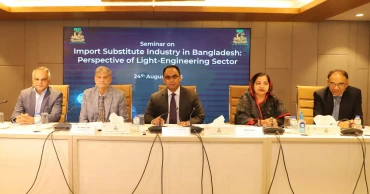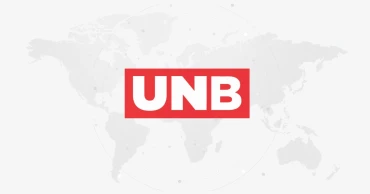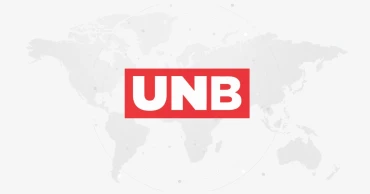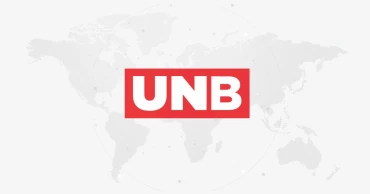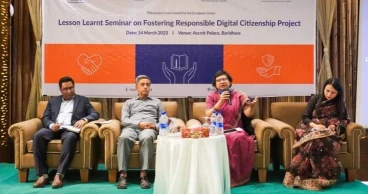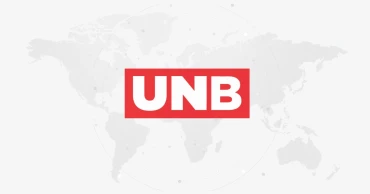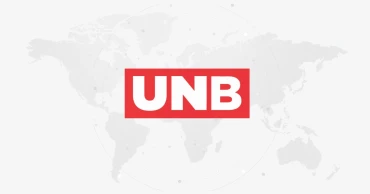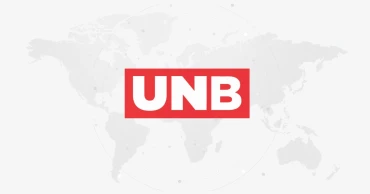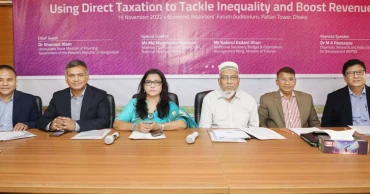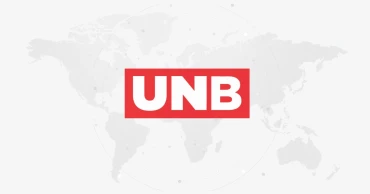Speakers
Policy consistency needed for a vibrant light engineering sector: Speakers
Speaker at a seminar here on Thursday said research, innovation and policy consistency are key to the growth of the light engineering sector which now contributes 3 percent to the country's GDP.
They said the light engineering sector is now facing different challenges including policy inconsistency, lack of easy access to finance, quality of products, lack of lab and R&D (research and development) and data of actual demand.
Read: How to Deactivate TIN in Bangladesh: A Comprehensive Guide
Dhaka Chamber of Commerce & Industry (DCCI) arranged the seminar titled “Import Substitute Industry in Bangladesh: Perspective of Light Engineering Sector” held at the DCCI Bhaban in the city.
Addressing the function, Planning Minister MA Mannan said if Korea, Taiwan, Malaysia and China could successfully develop the light engineering sector, then Bangladesh will also be able to succeed in future.
Inconsistency among the government agencies regarding different policies is not good for the private sector, he said putting emphasis on policy consistency.
“If we can formalize the local small light engineering hub at Dholaikhal and Jingira, one day they will be able to contribute to the economy,” said the Minister.
Read: WB to provide Bangladesh with $100 million to control dengue: Health Minister
Industries Secretary Zakia Sultana said Bangladesh’s light engineering sector is still import based. The light engineering sector is an untapped sector, which has great prospects of creating a large backward linkage industry ensuring diversified industrial base.
Noting that the entrepreneurs of this sector should be incentivized to mitigate import reliance, she said the government will try to boost policy harmonization and coordination among the agencies concerned.
The industries secretary said the government is also planning to establish an Automobile Research Institute in Narayangonj with the help of Japan.
DCCI President Barrister Md. Sameer Sattar said if right policy support is given, the light engineering sector can serve as the backward linkage industry to many mainstream local industries like food, leather and footwear, electronics, agro-processing and pharmaceuticals industries.
“To secure the target of private investment to 27.35% of GDP by FY 2025, development of the light engineering sector is crucial as it will strengthen local value and supply chain in many allied industries,” he said noting that the light engineering sector was recognized as a high-priority sector in the Industrial Policy 2022.
Read: Coordinated Call Centre launched for power sector consumers with hotline number 16999
He, however, said the current tariff structure on import of light engineering products is counter-productive for the growth of the local light engineering sector.
The DCCI president urged the authorities concerned to bring appropriate changes in the tariff structure that will protect this sector.
Additional Managing Director of Walton SM Shoyeb Hossain Nobel in his keynote paper said the light engineering sector contributes about 3 percent to the GDP and it is growing at 10 percent every year. “In FY 2021-22 the export of light engineering sector was USD 796 million,” he said.
Citing that this sector is completely import based, he demanded separate duty structure and backward linkage industry policy for this sector. “Lack of easy access to finance, quality of products, demand uncertainty, policy inconsistency, no incentives for local manufacturers, lack of lab and R&D, data of actual demand are few of the challenges of this sector,” he said.
President of Bangladesh Steel Manufacturers Association Manwar Hossain said now attention should be given to other promising sectors alongside the readymade garment one.
Read: China to support Bangladesh in joining BRICS: XI tells Hasina during talks
Chief Marketing Officer of Fair Group Mohammad Mesbah Uddin emphasized on proper policy guidelines, upgrading science and technology-based education system and maintaining long-term policy consistency to unlock the potentials of this sector.
Former DCCI President Matiur Rahman, Director of Meghna Group Muhammad Mushtaque Ahmed Tanvir and Managing Director & CEO of Transcom Electronics Limited Arshad Huq also spoke at the seminar, while DCCI senior vice president SM Golam Faruk Alamgir (Arman) gave vote of thanks, said a press release.
2 years ago
Business management should focus on public welfare: Speakers
Although profit is the main reason for setting up a business, business management should not only focus on individual gains but also consider the welfare of the public.
Speakers said this at a seminar titled “Importance of Business Ethics: Perspective Bangladesh,” held on Sunday at the seminar hall of Ahsanullah University of Science and Technology (AUST) in the capital.
The seminar was jointly organized by Ethics Education for Sustainable Development (E2SD) and the School of Business, AUST, said a press release.
Read: Banglalink to observe 'Ethics and Compliance Week 2022'
They said that there are instances of profit manipulation that deviate from ethical standards. Examples include practices such as giving less weight, food adulteration, selling rotten or expired food, and mixing harmful chemicals in fruits and vegetables. These unethical profit-seeking activities have had a significant negative impact on people’s lives, added the release.
The speakers emphasized the importance of conducting business in accordance with ethical standards. They stressed that business management should not only focus on individual gains but also consider the welfare of the public. If business organizations’ managers operate with these considerations in mind, the entire nation will benefit, ensuring sustainable development. Similarly, the workforce, inspired by ethical standards, will strive to adhere to them, avoiding the problems caused by unethical business practices.
Read: Nagad-DRU Reporting Award: Speaker Shirin for maintaining professional ethics
Presided over by Kazi Rafiqul Alam, president of DAM, SWAN Group Chairman Khabeer Uddin Khan graced the event as the chief guest.
It is worth noting that E2SD of Dhaka Ahsania Mission and the North American Islamic Community (NABIC) are jointly working towards establishing a peaceful society by promoting ethics and values.
2 years ago
Speakers emphasise modernising country's food safety system
Stating around 10.62 million tonnes of food are wasted every year in Bangladesh, speakers at an international conference on Sunday laid emphasis on modernising the country’s food safety system to prevent food losses and ensure safer food.
They also said the presence of unsafe and contaminated food poses significant health risks, leading to various diseases such as diarrheal diseases and cancer while the annual economic losses from just six diseases alone in Dhaka city are around $1.65 billion.
Also Read: 10th International Food Security Conference to be held in Dhaka on Sunday
The experts urged private entrepreneurs to invest in the agriculture sector for making good profit as well as helping the country overcome challenges in ensuring food security and building a healthy nation.
The International Finance Corporation (IFC) Bangladesh in collaboration with the Bangladesh Food Safety Authority arranged the "10th International Food Security Conference" at a city hotel.
Food Minister Sadhan Chandra Majumder inaugurated the conference as the chief guest. The theme of this year’s conference “Keeping Food Safe and Nutritious, Preventing Losses” focused on climate change as well as good food safety practices, and the impact of reducing nutrition and food waste.
Speaking at the programme, the minister said the government is committed to ensuring nutrition and food safety as it is a prerequisite for building a healthy and prosperous nation.
Also Read: FAO DG lauds PM Hasina’s leadership in ensuring food security in Bangladesh
“Food is one of the basic human rights. According to our constitution, the basic responsibility of the state is to ensure food for all citizens. We also consider ensuring nutrition for people and improving public health as the primary responsibility of the state,” he said.
The minister called upon the experts to shed light on the challenges in ensuring food security in the country and find out their solutions.
He said Bangladesh Safe Food Authority is playing the role of the main coordinator to ensure food safety in the country. “But it is not possible to do it with only one authority or ministry. Everyone has to come on one platform and do proper and logical things to create effective safe food management.”
ALso Read: Bangladesh receives $858 mln World Bank fund for agriculture growth, road safety
The minister also said that Bangladesh needs to adopt comprehensive and effective measures to deal with the multifaceted problem of ensuring safe food. “So, proper research and development is required. Adequate investment is needed for building capacity and conducting science-based research."
IFC Director of Global Manufacturing‚ Agribusiness and Services Wagner Albuquerque de Almeida said there is no question that food safety is critical for health and for economic development. "Food safety and reduced food losses can only be ensured with the active participation of the private sector, and partnership with the public sector, and we must work together if we are to achieve our goals.”
Food Ministry’s acting secretary Salma Mumtaz said it is necessary to ensure nutrition and quality food for building a healthy nation and enhancing the country’s development.
She also said proper steps should be taken to reduce post-harvest food losses and food wastage at different stages and enhance the food safety mechanism to ensure the food safety of the country.
Agriculture Ministry Additional Secretary Rabindra Shree Barua said being a small country it is a big challenge for Bangladesh to feed its 180 million people with quality food by increasing production.
He said Bangladesh has made significant progress in the agriculture sector and the country has achieved self-sufficiency in cereal production. “But climate change is one of the big challenges for the country in ensuring food safety. We’re facing growing natural disasters, including cyclones, floods, excessive rainfall and drought, and heat waves caused by climate change, affecting food production."
Also Read: Food Safety Day: Checking trans-fat intake demanded
Barua also said lack of quality food processing facilities, quality silos, and multiple uses of land are also barriers to ensuring food safety in the country. “Our silos are not getting rest and our land is not getting rest as we grow two-three crops in a year.”
He said salinity in the coastal region is another factor that is hampering food production, forcing the government to invest in research for developing salinity tolerance crop varieties.
“Food contamination caused by the use of excessive fertilizer and pesticides is a challenge in ensuring quality food. Our farmers believe that the more they use fertilizers, the more they will get crops. So, we’re trying to make the farmers aware of using the fertilizer and pesticides,” Barua said.
About 300 local delegates and 43 foreign representatives from 24 countries, including IFC representatives, policymakers, top food producers, manufacturers, retailers, tourism companies, cold chain logistics providers, consumer organizations, and other key stakeholders participated in the conference.
2 years ago
Role of BAB crucial to achieving $100 billion export target: Speakers
Speakers in a discussion said that the role of Bangladesh Accreditation Board (BAB) is crucial in attaining high export target of $100 billion by 2025-26.
They said this in a discussion meeting on the occasion of International Accreditation Day-2023 jointly organized by Dhaka Chamber of Commerce and Industry (DCCI) and Bangladesh Accreditation Board (BAB) at DCCI auditorium on Sunday.
Also Read: NBR-private sector partnership crucial to achieve high revenue target: DCCI President
Industries Minister Nurul Majid Mahmud Humayun, MP was present here as the chief guest while Industries Secretary Zakia Sultana and DCCI President Barrister Md. Sameer Sattar were present as special guests. Director General (Additional Secretary) of BAB Md. Monwarul Islam chaired the program.
Also Read: Target $100 bn export earnings by 2026: Commerce Minister
Nurul Majid said that the motto of this year’s accreditation day is “Accreditation: Supporting the Future of Global Trade” which is a very timely selection.
He said, “if we can maintain the quality of products and services, we can grab the international market easily. For the sake of the country and to create confidence in our products in the global competitive market, BAB is working relentlessly to create awareness.”
DCCI President Barrister Md. Sameer Sattar said that in the international market Bangladesh’s total trade was $141.42 billion. Bangladesh is gradually progressing to an export oriented country from import dependent country.
In the last fiscal year, Bangladesh’s export was more than $52.08 billion. And for this export accreditation is a very important tool. To show the quality of specific products, there is a need for internationally accredited certificates and these certificates play a pivotal role in boosting exports, he said.
Also Read: Bangladesh’s apparel export to cross $100 bn by 2030: experts
Accredited products or services can enter into any MRA “Mutual Recognition Arrangement” country easily. At present Accreditation is not an auxiliary but it is now a must for world trade.
BAB has taken initiative to get the membership of International Accreditation Forum (IAF), said Monwarul Islam, DG of BAB.
2 years ago
Responsible use of digital media can bring positive change in society: Speakers
Experts and stakeholders discussed different possibilities and obstacles in using digital media in Bangladesh and suggested bringing positive changes in society with the responsible use of online media at a seminar on digital citizenship and freedom of expression at a hotel in the capital Tuesday.
Social enterprise Dnet organised the programme titled "Lesson Learnt Seminar on Fostering Responsible Digital Citizenship" was organised with the support of the European Union (EU) and Friedrich Naumann Foundation for Freedom.
The success and learning aspects of the various capacity-building, awareness and advisory initiatives taken under the "Foster Responsible Digital Citizenship to Promote Freedom of Expression in Bangladesh" project and steps that need to be taken in the future were discussed.
University students, teachers, law enforcement officials, domestic and foreign development sector officials, lawyers, government officials and media workers were present.
UNB Editor Farid Hossain, Bangladesh Parliament Secretariat Additional Secretary Mahbooba Panna, and Sadik Hasan, associate professor of public administration at Dhaka University, were the panellists.
"Our sense of etiquette comes from the kind of etiquette we practice in real life and we get this education from our family. Nowadays due to changes in family structure, proper etiquette is not being developed and the effect is visible on online media," said Farid Hossain.
Read more: Mass awareness needed to ensure safe use of digital platforms: Speakers
Mahbooba said: "Just as it was made compulsory for everyone to have a Covid certificate after the arrival of Covid, can we not introduce digital citizenship certificates for everyone in this digital age?"
Sadik said: "Digital citizenship should be taken to the school level. But before that, it should be decided what will be taken to them, who will take it, how it will be taken."
M Shahadat Hossain, co-founder and executive director of Dnet, said: "Through the Foster Responsible Digital Citizenship project, many young people have been able to learn about exercising their rights safely in the digital world. Our goal is to ensure that youth express themselves within the confines of the law."
Fani Farmaki from EU Delegation to Bangladesh and Naira Nizam from Friedrich Naumann Foundation also spoke at the event.
The issues discussed at the seminar are also available at https://www.digitalcitizenbd.com where a few courses on digital citizenship are also being offered for free.
2 years ago
Curtain rises on Dhaka Lit Fest 2023 Thursday
The tenth edition of the Dhaka Lit Fest will be held at the Bangla Academy from January 5 to 8.
The fest will host many award-winning authors and internationally acclaimed speakers, including Nobel laureate Abdulrazak Gurnah; winners of the Booker and International Booker, Neustadt International, PEN/Pinter, Prix Médicis, Academy Award, Windham-Campbell Prize, Albert Medal, Waterstones Children's Book Prize, and Aga Khan Award.
Read more: 32 bands to take the stage of Dhaka Rock Fest 3.0 on December 27,28
This year's line-up also features Nuruddin Farah, Amitav Ghosh, Hanif Kureishi, Pankaj Mishra, Tilda Swinton, Jon Lee Anderson, Onjali Rauf, Sarah Churchwell, Geetanjali Shree, Daisy Rockwell, Esther Freud, Alexandra Pringle, Dame Sarah Gilbert, Marina Mahathir, Joy Goswami, Anisul Hoque, Mashrur Arefin, Kamal Chowdhury, Muhammad Zafar Iqbal, Marina Tabassum, Syed Manzoorul Islam, Imdadul Haq Milan, Kaiser Haq, Shaheen Akhtar, Amitabh Reza, Azmeri Haque Badhon and more.
Over 500 speakers, performers, and thinkers representing five continents will participate in the four-day event with over 175 sessions.
Along with a diverse mix of conversations and dialogues, and sessions on science and technology, there will also be activities for children, and young adults, film screenings, and theatrical, music, and cultural performances at the fest.
Read more: Ganga-Jamuna Cultural Festival 2022 draws to a close
Dhaka Tribune and Bangla Tribune are the event's title sponsors, City Bank platinum sponsor, and British Council is the strategic partner.
Online registration for the fest is now open. Tickets are available for Tk200 and Tk500, and entry will be free for children under 12.
3 years ago
Industries can now use LPG as a reliable energy solution: Speakers
Speakers at a seminar have said that many industries can now use liquefied petroleum gas (LPG) as a reliable energy solution to meet their needs in the nagging gas crisis.
“The price of LPG is flexible and reasonable. If there is some policy support, operators are ready to take the challenge in this regard,” said Azam J Chowdhury, president of LPG Operators Association of Bangladesh (Loab).
The Hydrocarbon Unit, a subordinate body of the Energy and Mineral Resources Division organized the virtual seminar on Monday titled: LPG: An Alternate Energy Solution for Industrial Segment in Bangladesh.
The Loab president said that if the country wants to keep the persistent 7 percent GDP growth, it must promote the LPG to grow its use in industrial and other sectors too as the natural gas alone cannot meet the growing demand.
“We’ve been providing LPG to different industries which have been suffering for the gas crisis. Now, the demand for LPG is growing at 30-40 percent” he added.He said the LPG sector needs some policy support to overcome its challenges.
Read more: 12kg LPG cylinder to cost Tk 46 more
A huge quantity of LPG is transported through river routes where navigation is essential while there must be some cut in taxes and stop allowing industries to collect gas from CNG stations in a risky way, he said.
He said setting up a dedicated deep sea port for LPG import should be top of the agenda to ensure a consistent supply of this petroleum fuel at a reduced cost as the current transport cost is so high.
“The operator cannot import LPG through large vessels over a capacity of 5000 metric tons due to the absence of a dedicated deep sea port,” he said.
Secretary of the Energy and Mineral Resources Division Mahbub Hossain, additional secretary Humayun Kabir, head of marketing of Bashundhara LPG, and CEO of Omera Petroleum Tamzeem Chowdhury spoke on the occasion while Director General of Hydrocarbon Unit Abul Khayer Md. Aminur Rahman moderated the event.
Jakaria Jalal said LPG can be suited for some specific industries depending on the design and its energy consumption.
He said there should be a unified pricing formula for all the available primary options including LPG, LNG and other liquid petroleum.
If the prices of all energy options are variable, then LPG will be much more sustainable, he added.
3 years ago
Speakers for recognising contribution of expatriates to Bangladesh economy
Speakers at a session of exchange of views in Lisbon have stressed the need of recognising the contribution of the expatriates to the economy of Bangladesh.
They also demanded removal of harassment and constraints that the expatriates face at the airports of Bangladesh and asked for more funding for expatriate’s dead body repatriation and financial assistance for needy expatriates and their families on their return to Bangladesh.
Remarking that expatriates contribute to building of foreign currency reserve in Bangladesh, the speakers called on the Bangladesh government to keep an eye on the reserve lest it be leaked or wasted.
As regards increasing remittance to Bangladesh, some of them urged the expatriate Bangladeshi businessmen to recruit more Bangladeshi workers in their businesses.
Bangladesh Embassy in Lisbon arranged the event with the members of the Bangladeshi expatriate community in Lisbon on December 7 on ways to increase remittance from Portugal to Bangladesh. The session was held at the auditorium of the Chancery building of the Embassy.
Leaders, businessmen, entrepreneurs, journalists and other members of the Bangladeshi community from Lisbon, Porto and other parts of Portugal attended the session.
At the outset of the session, Bangladeshi expatriates were invited to express their ideas and recommendations on how to enhance the flow of remittance to Bangladesh through legal channels.
Several community leaders, businessmen and general expatriates spoke.
Read more: “Bangladesh can be the right place for investment from Brunei”
The speakers expressed the feeling of satisfaction that expatriates had been playing a role in the socio-economic development of Bangladesh through their remittance. The speakers also acknowledged the importance of sending their remittance through banking channels.
They also felt the need of formation of a Bangladeshi business association in Portugal. If formed, the association could play a critical role in pursuing their interests with the Portuguese authorities, they remarked.
Some speakers also indicated that a ceiling set by the Portuguese government on the amount of remittance in a given period of time is hindrance to remittance of bigger amount through banking channel.
They requested the Embassy to take up this matter with the Portuguese government to relax this ceiling.
Ambassador Tarik Ahsan commended the Bangladeshi expatriates for sending to their dear ones in Bangladesh their hard-earned money that also helps development of the nation.
He acknowledged their contribution to the economy of Bangladesh, particularly in maintaining external balance of payment.
Ambassador Tarik mentioned that Bangladesh was currently the seventh largest remittance receiving country in the world.
He said although Bangladesh received 24.78 billion USD in the financial year 2020-21, it was reduced to 21.03 billion USD in the last financial year 2021-22.
He indicated that, in the current financial year, remittance flow declined in September and October, but picked up again in November.
The Ambassador said if remittance-to-GDP ratio of Bangladesh, which is now 6%, could be at par with that of some of her neighbours, which is at least 9 %, Bangladesh annual remittance could reach 40 billion USD.
Read more: Ensuring wellbeing of Bangladeshi expats is govt duty: PM
He called upon the Bangladesh’s expatriate community to come forward to make Bangladesh a top remittance receiving country in the world and make Portugal a significant remittance sending country to Bangladesh.
Ambassador regretted that sending remittance through non-banking channels helps money laundering from Bangladesh to foreign countries.
He also remarked that transaction through illegal channels may give a better rate, but ultimately it does not benefit the recipients much.
He argued that such illegal transactions lead to shortage of hard currency and consequent devaluation of Bangladeshi Taka, which leads to increase of cost of living in the country.
He said that Bangladesh government has taken many steps to encourage remittance through banking channels.
If necessary, more measures would be taken. However, he also stressed the need of consciousness of the expatriates to accept a little sacrifice in terms of lower rates of exchange for the greater interest of the nation.
The Ambassador said that aftermath of covid19 pandemic, Ukraine War and sanctions have caused a crisis of price rise of food, energy and raw materials worldwide and Bangladesh is not aloof from this global crisis.
He expressed the resolve that resilient people of Bangladesh including the expatriates, under the far-sighted leadership of Prime Minister Sheikh Hasina, will overcome the challenges and make Bangladesh come out stronger.
Ambassador declared that the Embassy of Bangladesh in Lisbon would like to honour the remittance senders of Portugal through a programme of conferring accolades on some remittance senders selected on the basis of some criteria.
3 years ago
Speakers urge to increase direct tax net
Speakers at a discussion emphasised increasing direct income tax to reduce increasing inequality in taxation system.
They came up with the remarks in seminar titled 'Combating Inequality and Direct Application to Increase Revenue Income' organized jointly by Policy Integration for Development (RAPID) and Economic Reporters’ Forum (ERF) at ERF auditorium on Saturday.
If all the taxable persons pay tax according to the income tax slab, it will be possible to achieve 3.1 percent by increasing the current 1 percent personal income tax as a proportion of GDP, they added.
Read more: Digital infrastructure key to attracting more remittance through legal channels, speakers say
For this, the number of registered taxpayers should be increased. At the same time, if tax exemptions are removed, it is possible to increase taxes by 2 percent of GDP, they opined.
Rapid chairman Dr. Mohammad Abdur Razzaque presented a keynote paper on the topic. He said Bangladesh's tax-GDP ratio is 9 percent, which is the lowest in the world. The main reason for this is that there are very few direct tax.
It should increase. Currently indirect tax 65 percent indirect and direct tax 35 percent. However, the initiative taken by the government to bring direct tax to 70 percent and indirect tax to 30 percent in the coming days is the right decision, Razzaq said. He said the two problems in Bangladesh are growing inequality and low government spending as a share of GDP. The main reason for this is the lack of direct tax. Although the number of direct tax has increased more than before.
However, in terms of GDP ratio and quantity, it is much lower in almost all countries of the world, including India, Bhutan, Malaysia, the government's income is more than that of Bangladesh.
Although the poor people of the country pay the highest VAT in proportion to their income. And people with higher income pay the least VAT.
Read more: ERF honoured with WCO Certificate of Merit 2022
He suggested to introduce social insurance system, by which evry person income will be counted and it will be easy collection tax.
Former NBR chairman Dr Nasir Uddin Ahmed, additional secretary of finance ministry Kabirul Ezdani Khan, professor development studies of DU and Executive Director, RAPID Dr. Abu Eusuf, among others, spoke in the seminar.
3 years ago
Speakers for removing bottlenecks in promoting cross border energy trade in SA
Speakers at a seminar have urged the countries in the South Asian region to remove bottlenecks in promoting cross border energy trade.
“We should work on removing hindrances in technical and legal process to establish cross border energy trade in the region”, said Waseqa A Khan, chairman of the parliamentary standing committee on power, energy and mineral resources while addressing the seminar.
Bangladesh Enterprise Institute (BEI) organized the two-day seminar titled: “Socio-Economic Impact of Cross Border Energy Trade (CBET) at the South Asian Sub Regional Level: A Bangladesh Perspective” in association with USAID and South Asia Regional Initiative in Energy Integration (SARI/EI) at a hotel in the city on Wednesday.
Waseqa Khan said there is no hindrances at the mass level. “But only hindrances are in the technical and bureaucratic levels”.
Read: Speakers stress for nurturing innovation to drive BD development
With BEI president ambassador Humayun Kabir in the chair, the event was also addressed by Power Cell director general Mohammad Hossain, SARI/EI project director Pankaj Batra, BEI senior research director Faiz Sobhan, and senior energy advisor of the USAID Bangladesh Shayan Shafi.
Mohammad Hossain said regional energy cooperation will definitely impact regional development.“Any initiative in this region will integrate the entire region.”
Pankaj Batra said Bangladesh energy sector is gas-based while Indian energy sector coal-based and Nepal’s energy sector hydro-based.
The regional countries can take initiative to utilize their additional resources for other neighboring countries, he noted.
A study report on the title of the seminar was unveiled in the function.
It was noted in the function that the US Agency for International Development (USAID) initiated the South Asia Regional Initiative for Energy (SARI/E) program in the year 2000, covering the eight countries in South Asia, viz. Afghanistan, Bangladesh, Bhutan, India, The Maldives, Nepal, Pakistan and Sri Lanka.
In the first three phases, the program, aiming to promote energy security in South Asia, worked on three focus areas: Cross Border Energy Trade (CBET); Energy Market formation; and Regional Clean Energy development.
SARI/E played a key role in integrating and promoting the energy policy and technology linkages across the South Asian nations.
3 years ago
